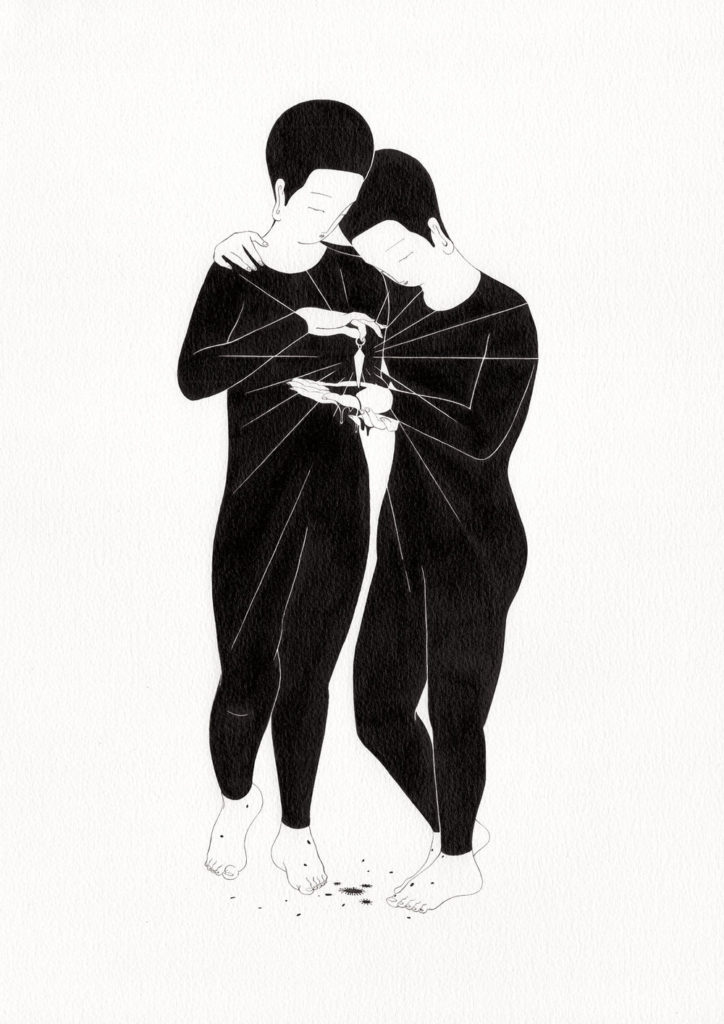
At my last session, my therapist asked me what I wanted to talk about. I had never felt more guilty saying it, but after 23 years of silence, I replied “I think I want to forgive my parents.” In that moment, I gave myself permission for the first time in my life to acknowledge out loud the resentment I carry towards my parents and the way I was raised. Even typing this now, I have tears running down my cheeks from the guilt of speaking out against the people who sacrificed everything to give me the best life they could. But I’m not just doing this for myself, I am doing this for my future children, so that I can relieve them and myself of the generational trauma that has inevitably been passed down to every child of immigrant families. It is possible to love and respect our families while still holding them accountable for their actions, even those that were involuntary. For the sake of our parents’ sacrifices, we deserve to live the best life we possibly can, which can only truly be done by healing the wounds left from our upbringing.
When I think back to my childhood, I hold my parents in such a respectful light. I feel so proud to have been raised by them and to have seen them work hard for the life they came to this country for. They’re my superheroes. It was only once my therapist asked me to write out a normal day in my household that I realized the little flaws that quietly added up over time. Again, I feel like prefacing this with the fact that I don’t blame them for any of these things — or so I like to tell myself. My dad is the hardest worker I know, so talented and crazy smart and it inspires me daily. But when I was growing up, and even now, he was supposed to be the “strong one” who held it all together. I never saw him sad, frustrated, confused, or any emotion that led me to believe he was anything less than a perfect, near-robotic human being. I didn’t realize he was now in a world where he couldn’t afford to make mistakes. As children, we adopt the behavior of those around us, and I was no exception to this. I’m sure he never meant to turn me into an emotionless perfectionist, but here I am today unable to show the world my flaws because I grew up thinking it meant I was weak. I wanted to be like my dad, strong and fearless and never needing a second chance because I always got it right the first time. Now, I want to be human, imperfect and relatable — but I don’t know how. My dad didn’t do this to me on purpose, his only intention was to protect me and give me the best life he could. But I can’t blame myself for growing into someone who can’t express emotions or make mistakes without crumbling, because that isn’t just my fault; it’s also his. I could never hate him for this or even feel angry towards him, because I know he only meant well, but he still deserves the responsibility of the trauma that resulted from his style of parenting. Even just admitting this to a screen allows me to relieve some of the pressure that has been hidden within me for the last 23 years. When he reads this, I hope that rather than feel sad or guilty, he feels hope that we both can now move on and change for the better.
If, like me, you need to hear it — this is your permission to feel angry, sad, confused, scared, and every other emotion that we’ve grown accustomed to hiding from our parents, and eventually even ourselves. I’m not asking you to resolve it all right now, but simply to allow yourself to feel it and understand it’s origin. When you grow up in a first-generation immigrant family household, there is generally no priority on mental health. When you watch your parents struggle to fit into a society that never intended to include them, your view on what “real” problems are shifts to a very dark place. When you’re forced to stand by and watch them fall victim to systematic racism time and time again, you become numb to your own issues that seem wildly insignificant in comparison. When the priority in your household is survival, how dare you dream to put yourself first? I would never blame my parents for this life, and that’s why it’s so hard for me to begin the journey of forgiving them. All they’ve ever wanted was for me to succeed in ways they could never dream, but within diasporic families, that often comes with the price tag of feeling like nothing you do will ever be good enough. What could possibly be worthy of the thanks that our parents deserve for what they went through? It wasn’t until I admitted this to myself that I realized how useless and unfruitful this thought process is to our end goal of achieving success. If we don’t recognize the deeply harmful internal dialogue that we’ve adopted in the process of trying to make our families proud, then we’re actually doing them a disservice by forcing ourselves into endless dissatisfaction. If we can’t find a way to make success and happiness tangible, that pool of resentment towards both them and ourselves will only grow over time. The only way to break the chain is to stop it in its tracks. It begins with tracing your flaws back to where they started, and understanding that putting that responsibility on your parents does not equate to disrespecting their sacrifices for you. Even if they didn’t mean to pass on their trauma to us, nothing good comes out of ignoring it. As we build our second-generation families, we can properly carry on the legacy that our parents created by accepting their flaws, recognizing them within ourselves, and mindfully going through the healing process of forgiving them. The intention isn’t to erase what they went through, but to shed new light to it and let us pass on our family values in a healthier way.
When you come from an immigrant family, you know how difficult and often times awkward it is to bring up conversations like these. However, coming from someone who’s been through it and came out the other side in a better place, I seriously encourage you to try it. I found that the deepest level of healing came from telling my parents that I was angry, sad, and hurt by the person I’ve become due to the trauma they passed on to me. It allowed me to heal in a way that still respected them and their journey in this country, but get the understanding I needed to feel seen. Beyond that, it made our relationship closer than ever before because I was finally fully honest with them. All I really needed to forgive them and move on was to just tell them how I felt. I hope they were even able to grow and heal themselves by realizing the wounds they still held onto from their life before America and our diaspora. Our parents have a lot of their own healing and forgiving to do in regards to their relationships with their parents that led them to be who they are today. I think we, as children of immigrants, often don’t want to burden our parents even further with our emotions and mental health. We assume they’ve got enough to deal with. In doing so, however, we restrict ourselves from a closeness that can only come from being completely and brutally honest with our parents. They deserve the full capacity of our love, which can only be given when we each see each other for who we really are. We are an extension of our parents, and hiding parts of ourselves from them will only ever cause them pain. I’m telling you from experience that while it’s understandably hard to change the dynamic of your relationship with your family, it’s absolutely doable and you deserve to give yourself an opportunity to have the connection you’ve always wanted with them. Even further, you deserve to live your life to the fullest, without carrying the responsibility of a trauma that isn’t yours.
The future is never decided for any of us, and therefore we have to take the opportunity to shape it into what we need and desire the most. Sometimes that means taking the painful journey into our past to rebuild the foundation that our lives were built on. Our families came to this country to give us the freedom to live life the way we choose, and now it’s up to us to honor their sacrifices by choosing thoughtfully.
This and other blog posts available on my Medium.
